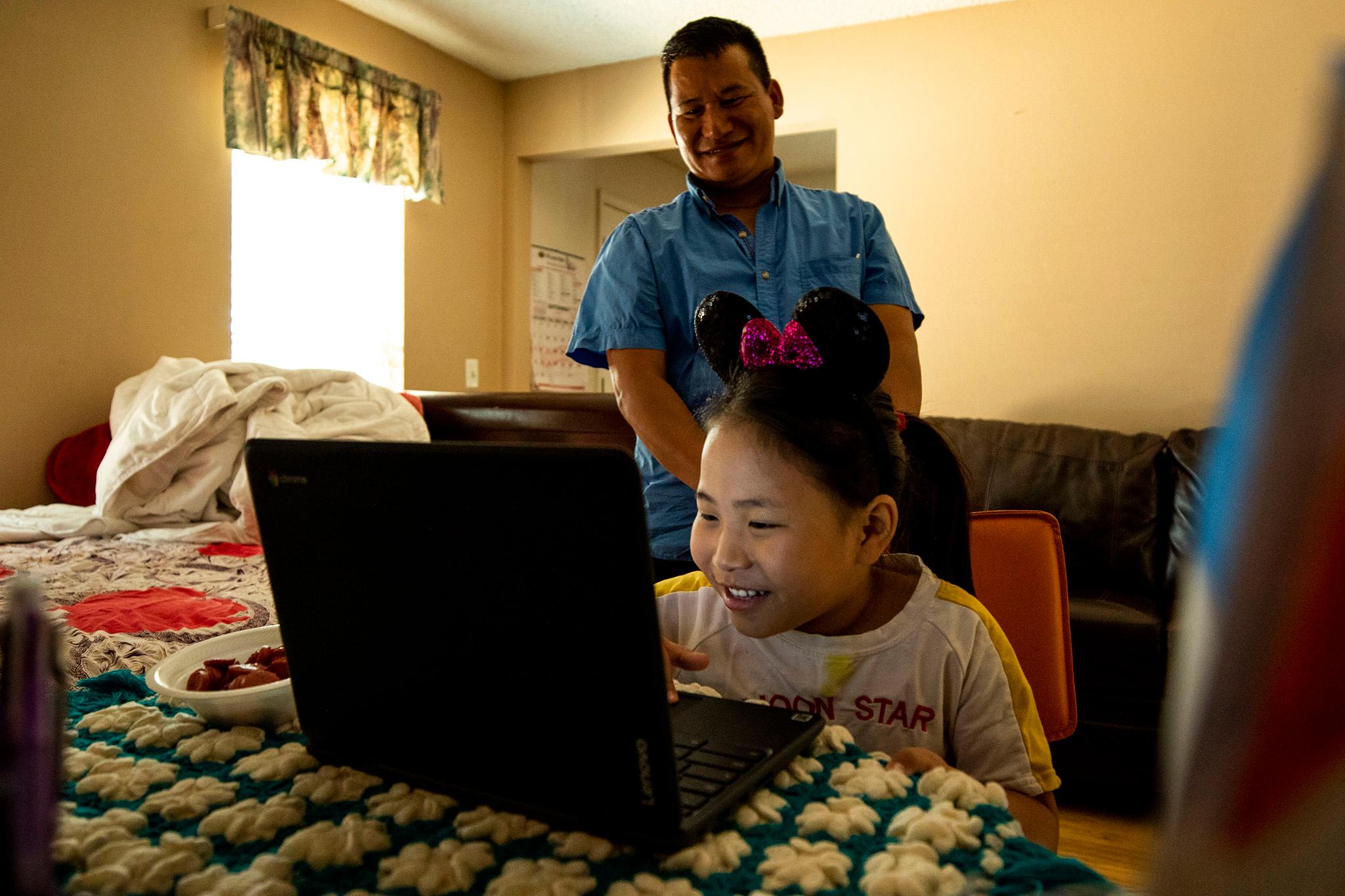
Seventh-grader Ayleen Salvador Barraza has been waiting for school to start for months. Yet on Tuesday — the first day of school — she missed it.
“I didn’t know the password,” she said dejectedly. “I only know the email. So I couldn’t really go.”
This is just one small example of the computer and technology challenges students and a district where English is not the native language of many families face. In Aurora Public Schools, students come from more than 130 countries and speak 160 languages. Those parents and students rallied and brought their hopes and worries to school district officials in a recent Zoom forum hosted by RISE Colorado, an education equity advocate.
Some worries the community shared:
- Will students get enough teacher time? Parent Soleil Barraza worries teachers will connect online just once a day for an hour and leave the responsibility with parents. “I have four children, for me, it’s impossible to do that,” she said.
- How does the at-home experience work? The sudden move to remote learning in spring left high school senior Gissele Bueno overwhelmed because she “didn’t have that same structure we did when we were in school.”
- What about emotional support for ‘the new normal?’ Parent Tamika Coleman is concerned that her daughter’s summer school didn’t address the pandemic, nor “any of the racism that has happened, the inequities” and wants the district to lean into the current zeitgeist.
- Hello, tech support? “We didn’t know where to go and how to solve the problem,” said parent Lagan Chamling Rai, who saw a major disconnect between the Bhutanese community and the technology others might take for granted. If a problem occurs, Rai said younger children didn’t know how to reconnect to a class.
Like so many of our shared screen interactions these days, it was also a chance for parents and students to ask questions and for district officials to give more details on what remote learning would look like.
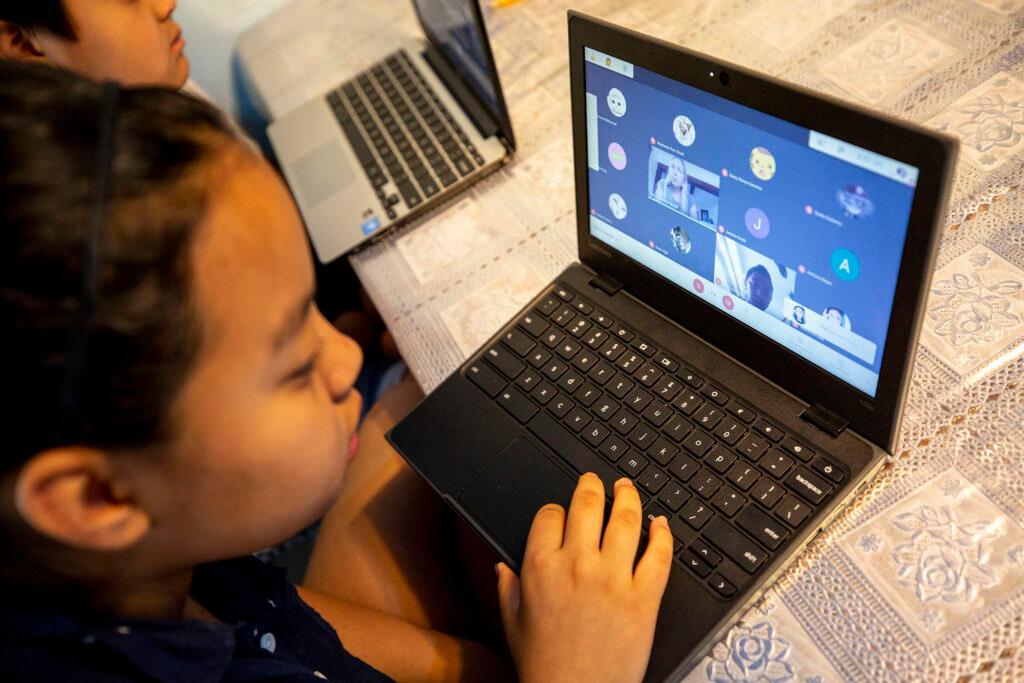
How the online classroom will work, take two
Jeff Park, executive director of Aurora Public School’s office of autonomous schools, assured families that teachers and classroom aides will spend a lot more direct time with students than in the spring. The goal is at least 60 percent of the day.
That should ease the concern of sixth-grader Reya Rai, no relation to Lagan Rai, who wanted more time to give feedback and get help to “the students who don’t understand what the teachers are teaching.” On the other hand, she also remembered her fellow students forgetting to mute themselves and “saying random stuff” that made it hard to hear the teacher.
Elementary and middle schools may start the day with activities to build class culture, such as how students treat one another. The rest of the day will alternate between blocks of learning and time where students work on assignments independently or in groups. Students will connect with teachers online at the end of the day.
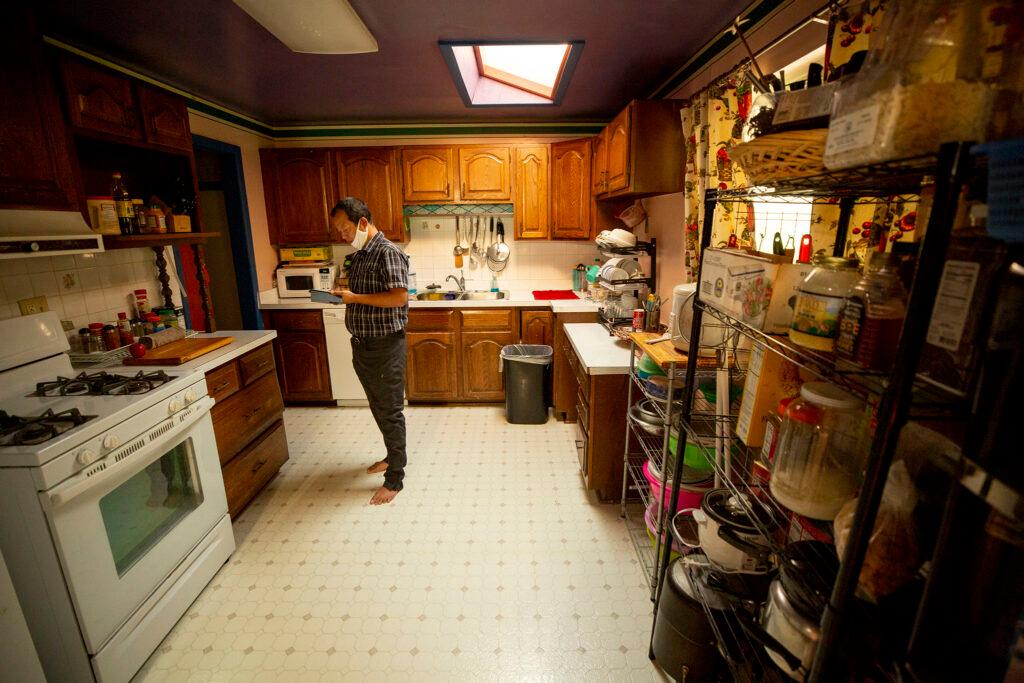
High school will look different. It will be just two classes for 20 days at a time. One three-hour class in the morning and another three-hour block in the afternoon, with independent study time built in. Another block at the end of the day will allow students to take an additional course if a student needs to catch up or earn more credits.
“Fingers crossed that we all get into this rhythm of three-hour learning, but I think you might find that concentrating on just one or two subjects allows you to be that much more focused and perform better,” Park told senior Gissele Bueno.
The district says it plans to bring college recruiters to families virtually, plans virtual college tours, and plans on expanding relationships with Hispanic-Serving Institutions and Historically Black Colleges.
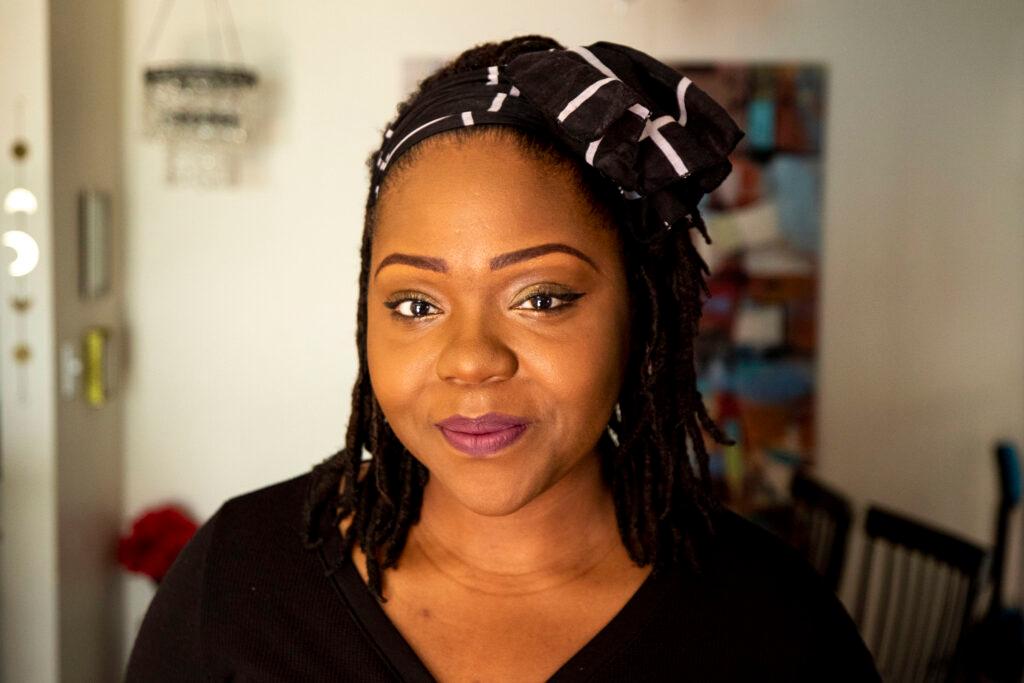
What school can do after a summer of pandemic and protests
Nationwide and Colorado protests against racism and inequality, especially in light of revelations into the death of Elijah McClain in Aurora, have been emotional and painful for many Black youths. Parent Tamika Coleman wants schools to address the emotional wellbeing of children and urged training for school staff to understand on a deeper level what Black children have experienced these past five months instead of resorting to discipline.
Not addressing societal issues compounds the trauma that Black children are feeling and the “underlying energy of fear” as she described it that can block success. Coleman wants the district to equip teachers and staff “so that they're aware of the emotional challenges that can affect the academic progress of students.”
It is taking a toll on parents and children. Her own young daughter believed a teacher was being racist to her.
“Who can she talk to?” Coleman asked. “There needs to be some kind of resource that helps us get through these things. So as my child logs off of her online classes, if she's feeling some type of way, she can talk to me, but who can we reach out to, to listen to her story and help me help her, help her help herself.”
Tameka Brigham, the district’s executive director of student success, said one solution might be schools hosting in-person mental health forums. She told parents to check in with their children to see where they are emotionally right now.
“Are there additional supports that they may need just someone to talk to? Do they need a friend/buddy circle that can look like a lot of different things depending on your child's age and how they've handled and channeled all of the energy over the past couple months.”
She said Aurora Public Schools will continue discussion sessions it began a year ago between Black boys and community partners and confronting the disproportionate disciplining of Black girls.
District policy director Christie Imholt said APS is evaluating its equity work — analyzing all board policies pertaining to students to ensure they are equitable, and focusing on recruitment and retention of teachers of color.
- What Colorado’s First Day Of School Looked Like In A Pandemic
- What Do Kids Miss About In-Person Learning? Play, Their Teachers And Real Learning
- Colorado School Districts Say They’re Ready To Roll. But Surveys Show Widespread Anxiety Among Teachers About Reopening
- What Is Cohorting? And Is It The Cure For Colorado’s Coronavirus School Worries?
Officials say expectations will be high for online learning but there will also be a focus on equity, grading fairly and creating a classroom where discipline and praise are given out equitably.
Brigham encouraged families to develop an “advocacy plan” with their children, such as speaking up when they don’t understand something or need a few extra minutes to complete an assignment.
“We want you speaking up,” she told students and families. “If you see anything in the classroom or online that doesn't feel right ... whether that's an adult or another student, be sure to use your voice and communicate that to your parents or stand up for what you believe to be right.”
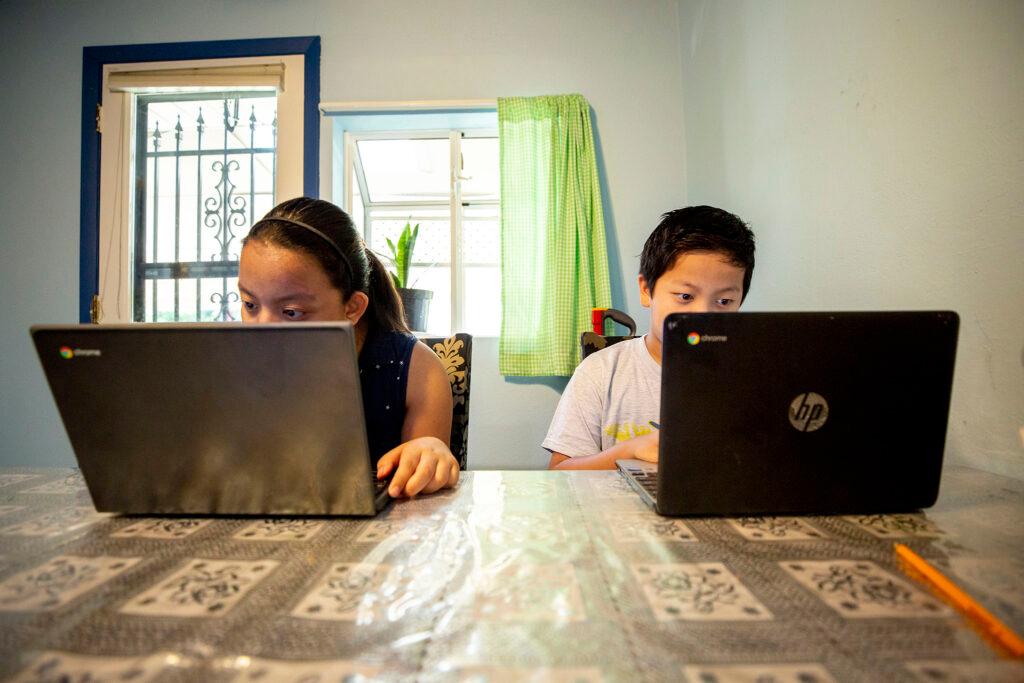
It’s more than tech support, it’s after school support
Parents are eager for tutoring, mental health guidance and more opportunities for physical activity.
There are concerns about the time students will spend in front of the computer and then when classrooms reopen, about social distancing and face masks. Parent Soleil Barraza suggests a day a week where kids can go to the park and can connect with nature.
“People feel better when they’re in contact with nature so it would be good if they could have some kind of lesson in the park because it’s good for children’s mental health as well.”
Officials encouraged parents to push school principals to partner with organizations that can assist with that. Students and parents may be able to host online classes about a topic or exercise classes.
Another parent, Lagan Rai, pressed for greater communication from teachers and the district via text, voice-mail and email. District officials told parents they are piloting a new app called Talking Points in part of the district that will allow families to communicate in different languages without having to wait days for translation.
“If we're successful using it, it will be scaled across all of APS,” said Park.
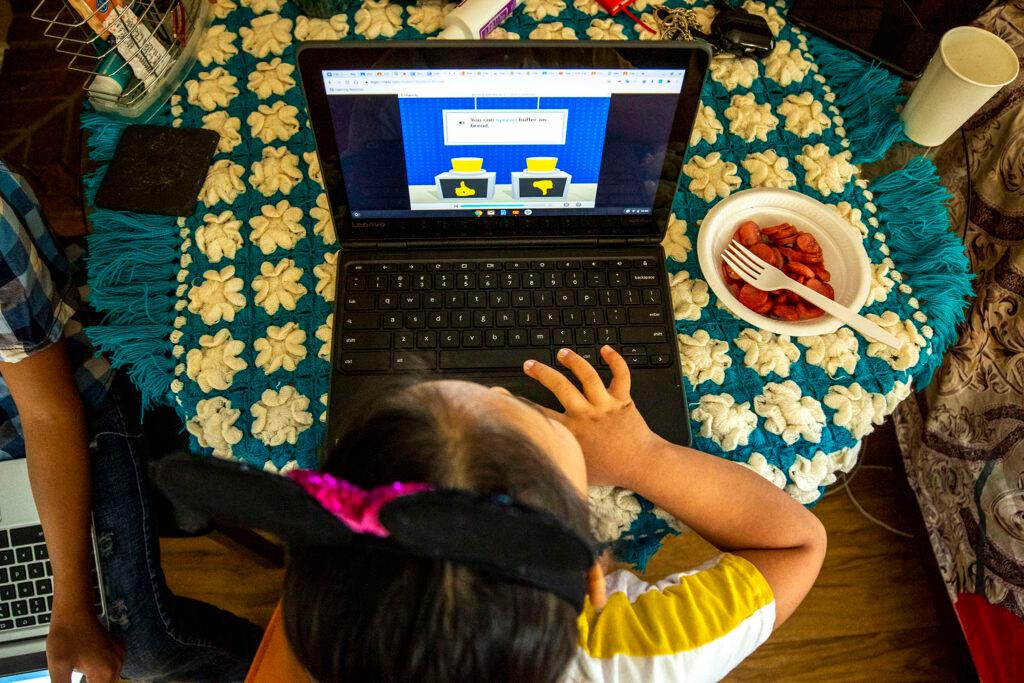
The district has also hired four more family liaisons who are native speakers in Spanish Swahili, Karen/Karenni and Nepali.
Officials assured families there will be support in helping parents understand how to use the technology. A ‘parent playbook’ has been created to teach parents technology skills.
Though she couldn’t log in to the first day of school, Ayleen Salvador Barraza went to her school building with her mom and got a new login and password. The second day back at school went a lot better.
“It’s OK, but I would like it a lot better if it was in-person. I just feel like we should be able to see each other and talk with each other. I want to socialize with other people and meet new people.”
And that’s another challenge for schools now that they are operating remotely, at least to start. Traditionally, brick and mortar schools provide for and pay attention to far more than just academics.
District officials stressed that students will still be able to pick up breakfast and lunch from school. That’s critically important in parts of Aurora. A RISE Colorado survey of Black, Latinx, Burmese, Karen, Karenni, Bhutanese and Nepali families found two-thirds of families have lost their jobs, more than a third face food insecurity, most have no or limited access to healthcare and almost a third have contracted COVID-19.
The organization has worked throughout the summer distributing emergency cash assistance, connecting families to mental wellness support and created a comprehensive resource guide for families.
“We, as a collective community, must do everything we can to support students and families with holistic and wraparound services to ensure their basic and essential needs are being met so they can thrive in school, in life... not just survive, but thrive,” Veronica Crespin-Palmer, RISE’s CEO told district leaders.









